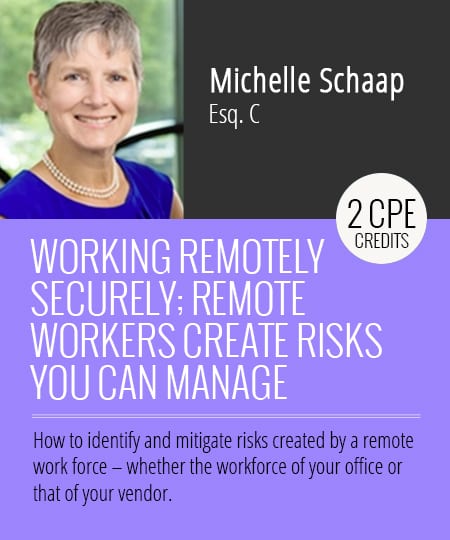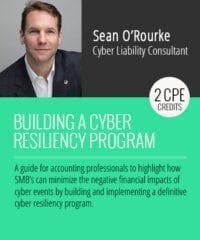This is a class consisting of two 25 minute lectures delving into the important discussion of a Remotely Working Work Force and How to Identify and Manage Associated Risks.
Learning Outcomes
This course learners will take away:
- How to identify and mitigate risks created by a remote work force – whether the workforce of your office or that of your vendor.
- How to better secure video conferences
- Practical tips for training personnel
- Important considerations regarding your incident response plans and vendor assessments with remotely working personnel
Core Values
Tonya Ugoretz, deputy Assistant Director of the FBI Cyber Division, spoke in April, 2020, and described the way that bad actors are exploiting remote workers and the uncertainty created by the COVID19 outbreak as a “collision of highly motivated cyber threat actors and an increase in opportunities.” The FBI’s Internet Crime Complaint Center (IC3) is currently receiving in excess of 3,000 cyber security complaints daily – more than triple the normal average.
Even before the COVID19 outbreak, more than 70% of cyber-attacks were targeting small to medium size businesses; and a remote, isolated workforce creates a wealth of opportunity for bad actors to exploit insufficiently secured and managed devices and to fool inadequately trained personnel.
As accountants, and trusted business advisors to your clients, you have an obligation to ensure the security and integrity of your clients’ data, no matter where that data may be viewed, accessed and printed.
This course will describe these increased risks and provide practical tips and actions to better secure your company’s assets and resources no matter where your personnel are working.
Resources
There is no text book for this course. There will be 2 – 25 minute lectures with powerpoint slides. Additionally, the courses will provide links and resources for:
- Risk frameworks accepted nationally
- Reporting resources in the event of a data breach or ransomware attack
- Reporting and tracing misappropriated funds by fraudulent wire instructions
Topics Covered in this Course
Lesson 1: Risks always present and new ones created with a remote work force and force majeure events
- New threats created by COVID and remotely working personnel
- “Known” threats and new issues raised with isolated, remotely working staff
- Secure Access
- Best practices for limiting and monitoring how personnel access work assets
- Credential Management
- Passwords, multifactor authentication and related topics
- Paper and Device Management
- Printing considerations and device management
Lesson 2: Law
- Video confenrence
- The problems observed with video conference tools and tips to manage the risk created
- Training personnel
- The importance of training personnel on cyber mindfulness
- Frauddulent wires
- Important resources available to try to recapture funds wired to a fraudster
- Ransonware
- Important resources available to try to recapture funds wired to a fraudster
- Incident response plans
- Given that you and your team members are now all working remotely
- Third party risks
- Risks with remotely working vendors and clients and your need to assess their practices
- Contracts
- Contractual obligations, including licensing of the remote access tools
- Insurance
- Coverage that reaches to the corners of the home offices of your staff and those of your third party resources
Each session will have a multi choice quiz after you have completed the module to make sure you’ll remember core ideas presented.
Attendance and Grading
All learners who have registered must watch all videos. Learners will be prompted to verify their presence every ten minutes as they watch the lecture videos. Home works are graded “pass” or “fail” based upon meeting deadlines and completing the assignment. We recommend watching one pre-recorded video Lesson per week. You must pass the quiz after each video in order to proceed to the next Lesson.
Live Office Hours
Live office hours are crucial to your understanding and application of course concepts. Because of the depth of this particular course, your instructor will hold one-hour sessions through ZOOM. You are required to attend. A ZOOM invitation for the live session will be sent to you as soon as you register for the course.
Each session will discuss in greater detail the topics covered in the lessons, and is intended to be interactive. This is your chance to ask questions of the instruction, and to learn from your fellow class mates.
Quizzes
There will be a quiz after the first segment, and an end of segment comprehensive course quiz. Final grades are given on a pass/ fail basis.
- Quizzes after each Lesson to verify learners understand core concepts and know how to apply them before advancing in the course. Minimum passing standards will be learners must achieve an 80% or higher grade for all end-of-Lesson quizzes to qualify to take the cumulative quiz. The LMS provides the quality control to ensure only learners who have achieved an 80% score in a Lesson quiz can advance in the course. Learners have three attempts to meet this requirement. Those who fail the end-of-Lesson quiz must watch the Lesson again and pass the quiz before advancing in the course.
- Final cumulative quiz-learners must have a comprehensive understanding of all course concepts delivered based on achieving a score of 90% or better in order to receive CPE credits. Only those who have achieved 80% or higher in Lesson quizzes qualify to take the final cumulative quiz. Group Leaders will monitor the performance of learners. All courses require learners to take the final cumulative quiz.
Course Instructor Biography
Michelle Schaap, Esq. C is Member of Chiesa Shahinian & Giantomasi PC (CSG), with offices in New York and New Jersey. She is an adjunct instructor for the New Jersey Small Business Development Corporation, and regularly lectures and speaks on cyber security and data privacy.
Combining her technology and corporate experience, Ms. Schaap has spearheaded and developed CSG’s cybersecurity practice. She regularly counsels clients on cybersecurity preparedness, advises clients when data security incidents arise, and trains companies on best practices for security procedures addressing both their business operations and clients’ concerns. Ms. Schaap assesses her clients’ risk management practices and security incident preparedness to develop a proactive response and recovery plan to enable her clients to recover from security breaches. Additionally, Ms. Schaap works with client in contract review, drafting and negotiation in critical areas of privacy and security.
Ms. Schaap received her Cybersecurity and Privacy Law Certification from Mitchell Hamline School of Law. She received her Juris Doctor from Rutgers School of Law – Newark, and graduated Cum Laude from Cornell University’s College of Arts & Sciences. Ms. Schaap is also a certified construction project manager, earning her certification from New Jersey Institute of Technology.
Ms. Schaap is a sought after lecturer and speaker. She has spoken on cyber security and data privacy at ISACA, the New Jersey State Bar Association, Professional Women in Construction, Newark Regional Business Partnership, and numerous other private and public forums. She has presented webinars for Lorman and Strafford.






